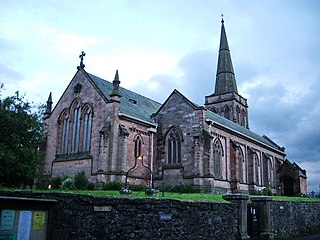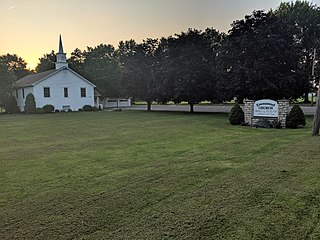Methodism, also called the Methodist movement, is a group of historically related denominations of Protestant Christianity whose origins, doctrine and practice derive from the life and teachings of John Wesley. George Whitefield and John's brother Charles Wesley were also significant early leaders in the movement. They were named Methodists for "the methodical way in which they carried out their Christian faith". Methodism originated as a revival movement within Anglicanism originating out of the Church of England in the 18th century and became a separate denomination after Wesley's death. The movement spread throughout the British Empire, the United States and beyond because of vigorous missionary work, and today has about 80 million adherents worldwide.
The Holiness movement is a Christian movement that emerged chiefly within 19th-century Methodism, and to a lesser extent influenced other traditions such as Quakerism, Anabaptism, and Restorationism. The movement is historically distinguished by its emphasis on the doctrine of a second work of grace, generally called entire sanctification or Christian perfection and by the belief that the Christian life should be free of sin. For the Holiness movement, "the term 'perfection' signifies completeness of Christian character; its freedom from all sin, and possession of all the graces of the Spirit, complete in kind." A number of evangelical Christian denominations, parachurch organizations, and movements emphasize those beliefs as central doctrine.
The Wesleyan Church, also known as the Wesleyan Methodist Church and Wesleyan Holiness Church depending on the region, is a Methodist Christian denomination in the United States, Canada, the United Kingdom, South Africa, Namibia, Sierra Leone, Liberia, Indonesia, and Australia. The church is aligned with the Wesleyan-Holiness movement and has roots in the teachings of John Wesley. It adheres to Wesleyan-Arminian doctrine and is a member of the World Methodist Council.
Sanctification literally means "to set apart for special use or purpose", that is, to make holy or sacred. Therefore, sanctification refers to the state or process of being set apart, i.e. "made holy", as a vessel, full of the Holy Spirit of God. The concept of sanctification is widespread among religions, including Judaism and especially Christianity. The term can be used to refer to objects which are set apart for special purposes, but the most common use within Christian theology is in reference to the change brought about by God in a believer, begun at the point of salvation and continuing throughout the life of the believer. Many forms of Christianity believe that this process will only be completed in Heaven, but some believe that complete holiness is possible in this life.
Christian perfection is the name given to a process of achieving spiritual maturity or perfection and is a theological concept that exists within many sects of Christianity. The ultimate goal of this process is union with God characterized by pure love of God and other people as well as personal holiness or sanctification. Other terms used for this or similar concepts include entire sanctification, perfect love, the baptism with the Holy Spirit, the indwelling of the Holy Spirit, baptism by fire, the second blessing, and the second work of grace.

The Higher Life movement, also known as deeper Christian life, the Keswick movement or Keswickianism, is a Protestant theological tradition within evangelical Christianity that espouses a distinct teaching on the doctrine of entire sanctification.
Pilgrim Holiness Church (PHC) or International Apostolic Holiness Church (IAHC) is a Christian denomination associated with the holiness movement that split from the Methodist Episcopal Church through the efforts of Martin Wells Knapp in 1897. It was first organized in Cincinnati, Ohio, as the International Holiness Union and Prayer League (IHU/IAHC). Knapp, founder of the IAHC, ordained and his Worldwide Missions Board sent Charles and Lettie Cowman who had attended God's Bible School to Japan in December 1900. By the International Apostolic Holiness Churches Foreign Missionary Board and the co-board of the Revivalist the Cowmans had been appointed the General Superintendents and the Kilbournes the vice-General Superintendent for Korea, Japan and China December 29, 1905. The organization later became the Pilgrim Holiness Church in 1922, the majority of which merged with the Wesleyan Methodists in 1968 to form the Wesleyan Church.
The conservative holiness movement is a loosely defined group of theologically conservative Christian denominations with the majority being Methodists whose teachings are rooted in the theology of John Wesley, and a minority being Quakers (Friends) that emphasize the doctrine of George Fox, as well as River Brethren who emerged out of the Radical Pietist revival, and Holiness Restorationists in the tradition of Daniel Sidney Warner. Schisms began to occur in the 19th century and this movement became distinct from parent Holiness bodies in the mid-20th century amid disagreements over modesty in dress, entertainment, and other "old holiness standards" reflective of the related emphases on the Wesleyan–Arminian doctrine of outward holiness or the Quaker teaching on the testimony of simplicity or the River Brethren and Restorationist teachings on nonconformity to the world, depending on the denomination. Christian denominations aligned with the conservative holiness movement share a belief in Christian perfection, though they differ on various doctrines, such as the celebration of the sacraments and observance of ordinances, which is related to the denominational tradition—Methodist, Quaker, Anabaptist or Restorationist. Many denominations identifying with the conservative holiness movement, though not all, are represented in the Interchurch Holiness Convention; while some denominations have full communion with one another, other bodies choose to be isolationist.
Outward holiness, or external holiness, is a Wesleyan–Arminian doctrine emphasizing modest dress and sober speech. It is a testimony of a Christian believer's regeneration, done in obedience to God. The doctrine is prevalent among denominations emerging during the revival movements, including the Methodists, as well as Pentecostals. It is taken from 1 Peter 1:15: "He which hath called you is Holy, so be ye holy in all manner of conversation."

The Evangelical Methodist Church (EMC) is a Christian denomination in the Wesleyan-Holiness tradition headquartered in Indianapolis, Indiana. The denomination reported 399 churches in the United States, Mexico, Burma/Myanmar, Canada, Philippines and several European and African nations in 2018, and a total of 34,656 members worldwide.
The Bible Missionary Church, founded in 1955, is a Christian denomination in the Wesleyan-Holiness tradition aligned with the Conservative Holiness Movement. It is headquartered in the United States.
The Evangelical Church of North America (ECNA) is a Wesleyan-Holiness, Protestant Christian denomination headquartered in Clackamas, Oregon. As of 2000, the Church had 12,475 members in 133 local churches. The Church sponsors missionaries in seven countries.
God's Missionary Church is a Methodist denomination within the conservative holiness movement. It was organized in 1935 as a result of gospel tent revivals held throughout central Pennsylvania by evangelists Rev. William Straub and Rev. Daniel Dubendorf.

Wesleyan theology, otherwise known as Wesleyan–Arminian theology, or Methodist theology, is a theological tradition in Protestant Christianity based upon the ministry of the 18th-century evangelical reformer brothers John Wesley and Charles Wesley. More broadly it refers to the theological system inferred from the various sermons, theological treatises, letters, journals, diaries, hymns, and other spiritual writings of the Wesleys and their contemporary coadjutors such as John William Fletcher.
The Finished Work is a doctrine associated with Pentecostals of the Finished Work Pentecostal tradition, that locates sanctification at the time of conversion; afterward the converted Christian progressively grows in grace. This is contrary to the Wesleyan doctrine of entire sanctification that locates complete sanctification in a definite second work of grace which Holiness Pentecostals teach is a necessary prerequisite to receive the baptism in the Holy Spirit. Finished Work Pentecostals are generally known to have retained the doctrine of progressive sanctification from their earlier Reformed roots, while Holiness Pentecostals retained their doctrine of entire sanctification from their earlier Wesleyan roots. The term finished work arises from the aphorism "It's a Finished Work at Calvary", referring to both salvation and sanctification. Though the term is used within Pentecostal Christianity, it is not exclusively a Pentecostal doctrine.
In religion, a covenant is a formal alliance or agreement made by God with a religious community or with humanity in general. The concept, central to the Abrahamic religions, is derived from the biblical covenants, notably from the Abrahamic covenant. Christianity asserts that God made an additional covenant through Jesus Christ, called the "new covenant".
According to some Christian traditions, a second work of grace is a transforming interaction with God which may occur in the life of an individual Christian. The defining characteristics of the second work of grace are that it is separate from and subsequent to the New Birth, and that it brings about significant changes in the life of the believer.
Pentecostalism is a renewal movement within Protestant Christianity that places special emphasis on a direct personal relationship with God and experience of God through the baptism with the Holy Spirit. For Christians, this event commemorates the descent of the Holy Spirit upon the followers of Jesus Christ, as described in the second chapter of the Book of Acts. Pentecostalism was established in Kerala, India at the start of the 20th century.
The Interchurch Holiness Convention (IHC), formerly the Interdenominational Holiness Convention, is an ecumenical organization of denominations and congregations within the conservative holiness movement. Aligned with the conservative holiness movement, the majority of these IHC members are Methodist, though others have a Quaker, Anabaptist or Restorationist background. There are a number of denominations aligned with the conservative holiness movement, however, that are not affiliated with the Interchurch Holiness Convention. The IHC was founded in 1952 during the post-World War II era. Thousands of individuals are present at the Interchurch Holiness Convention's annual international meeting that is usually held in Dayton, Ohio or in Gatlinburg, Tennessee; in addition the Interchurch Holiness Convention hosts regional meetings at local churches in different parts of the world throughout the year.

The Emmanuel Association of Churches is a Methodist denomination in the conservative holiness movement.




